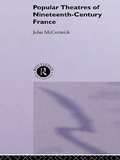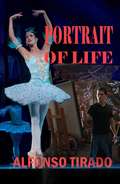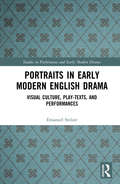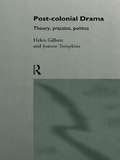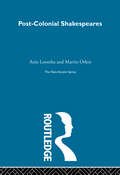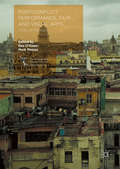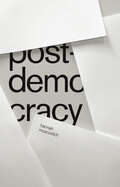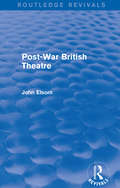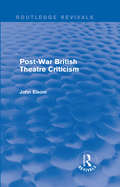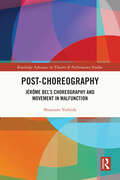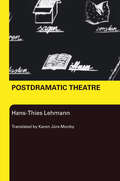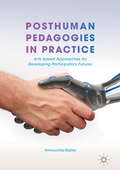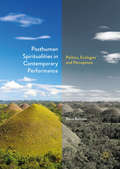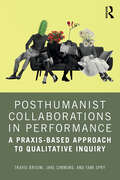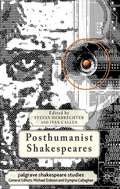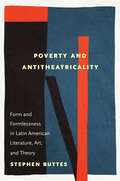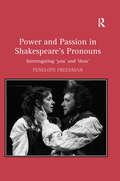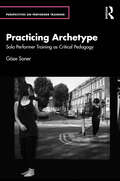- Table View
- List View
Popular Theatres of Nineteenth Century France
by John McCormickThis is the only book to provide an account of how popular theatre developed from the fairground booths of the eighteenth century to become a vehicle of mass entertainment in the following century. Whereas other studies offer a traditional approach to the theatres of high culture, John McCormick takes the role of impartial historian, uncovering the popular theatres of the boulevards, suburbs and fairgrounds. He focuses on the social and economic context in which vaudevilles, pantomimes and melodramas were performed, and explores the audiences who enjoyed them.
Portrait of Life
by Alfonso Tirado Barbara HenzePortrait of Life, is the novel with which Alfonso Tirado reincorporates his artistic talent to the world of narrative. For those who have enjoyed his works before, it will come as no surprise to see the spirit of a man who has traveled the world, coming from this author. His narrative, agile and ingenious, with a very precise language, allows you to go through its pages with the certainty of being on the right path and enjoy reading each chapter. Portrait of Life, is a novel that blends the eternal insurmountable love, treated as the phenomenon in itself with what occurs between different members of an elite, which amalgamates that of the artistic and social worlds of New York City. In the story they live the sublime moments of unexpected love between a painter and his model. The memories, the sufferings and the successes of a Russian ballet dancer in New York and the episodes of violence and corruption of the Mafia, in a relationship that brings the protagonists to unpredictable levels. The author takes us through the story, with occasionally erudite descriptions, which are intertwined in a temporality, which is sometimes chaotic, to finally culminate in the drama that is captured in a portrait of the ballerina, which keeps evidence, not only of her artistic personality, but also of the love story between two beings of exquisite sensitivity.
Portraits in Early Modern English Drama: Visual Culture, Play-Texts, and Performances (Studies in Performance and Early Modern Drama)
by Emanuel StelzerPortraits in Early Modern English Drama studies the complex web of interconnections that grows out of the presentation of portraits as props in early modern English drama. Emanuel Stelzer considers this theory from the Elizabethan age up to the closing of the theatres. This book examines how the dramatic text and the subjectivities of the dramatis personae are shaped and changed through the process of observation and interpretation of pictures in the dramatic actions and dialogues. Unlike any previous study, it confronts when a portrait is clearly meant not to be a miniature. This also has bearings on the effect of the picture on the audience and in terms of genre expectation. Two important questions are interrogated in the book: What were the price and value of these portraits? and What were the strategies deployed by the playing companies to show women’s portraits in a theatre without actresses? This book will be of interest to different areas of research dealing with the history of drama and literature, material and visual culture studies, art history, gender studies, and performance studies.
Positionen.Entwicklungen.Erfahrungen – 10 Jahre Junge Opern Rhein-Ruhr: Dokumentation der Konferenz zum Festival „Auf die Ohren, fertig, los!“
by Christiane Plank-Baldauf Merle FahrholzHören, Sehen, Staunen – in den deutschsprachigen Opernhäusern kann junges Publikum seit über zehn Jahren viel entdecken! Die vorliegende Dokumentation fasst die Ergebnisse der Konferenz „Auf die Ohren, fertig los!“ der Jungen Opern Rhein-Ruhr zusammen und gibt Einblicke in künstlerische Produktionsbedingungen, ästhetische Handschriften, Vermittlungsarbeit, institutionelle Rahmenbedingungen und fokussiert aktuelle Uraufführungen des Kooperationsverbunds. Die Ergebnisse der Konferenz werden zudem in einen übergreifenden Kontext gesellschafts- und kulturpolitischer Entwicklungen im Musiktheater für junges Publikum im deutschsprachigen Raum gestellt.
Possessed Voices: Aural Remains from Modernist Hebrew Theater (SUNY series in Contemporary Jewish Literature and Culture)
by Ruthie AbeliovichFinalist for the 2020 Jordan Schnitzer Book Award in the category of Jews and the Arts: Music, Performance, and Visual presented by the Association for Jewish StudiesPossessed Voices tells the intriguing story of a largely unknown collection of audio recordings, which preserve performances of modernist interwar Hebrew plays. Ruthie Abeliovich focuses on four recordings: a 1931 recording of The Eternal Jew (1919/1923), a 1965 recording of The Dybbuk (1922), a 1961 radio play of The Golem (1925), and a 1952 radio play of Yaakov and Rachel (1928). Abeliovich traces the spoken language of modernist Hebrew theater as grounded in multiple modalities of expressive practices, including spoken Hebrew, Jewish liturgical sensibilities supplemented by Yiddish intonation and other vernacular accents, and in relation to prevalent theatrical forms. The book shows how these recorded performances provided Jewish immigrants from Europe with a venue for lamenting the decline of their home communities and for connecting their memories to the present. Analyzing sonic material against the backdrop of its artistic, cultural, and ideological contexts, Abeliovich develops a critical framework for the study of sound as a discipline in its own right in theater scholarship.
Post-Colonial Drama: Theory, Practice, Politics
by Helen Gilbert Joanne TompkinsPost-Colonial Drama is the first full-length study to address the ways in which performance has been instrumental in resisting the continuing effects of imperialism. It brings to bear the latest theoretical approaches from post-colonial and performance studies to a range of plays from Australia, Africa, Canada, New Zealand, the Caribbean and other former colonial regions. Some of the major topics discussed in Post-Colonial Drama include: * the interactions of post-colonial and performance theories * the post-colonial re-stagings of language and history * the specific enactments of ritual and carnival * the theatrical citations of the post-colonial body Post-Colonial Drama combines a rich intersection of theoretical approaches with close attention to a wide range of performance texts.
Post-Colonial Shakespeares (New Accents Ser.)
by Ania Loomba Martin OrkinFirst published in 2002. Routledge is an imprint of Taylor & Francis, an informa company.
Post-Conflict Performance, Film and Visual Arts
by Des O'Rawe Mark PhelanDrawing on a range of cities and conflicts from Europe, Africa and the Middle East, the collection explores the post-conflict condition as it is lived and expressed in modern cities such as Berlin, Belfast, Bilbao, Beirut, Derry, Skopje, Sarajevo, Tunis, Johannesburg and Harare. Post-Conflict Performance, Film and Visual Arts: Cities of Memory investigates how the memory of conflict can be inscribed in historical monuments, human bodies and hermeneutic acts of mapping, traversing, representing, and performing the city. Several essays explore the relations between memory, history and urban space; where memory is located and how it is narrated, as well as various aspects of embodied memory; testimonial memory; traumatic memory; counter-memory; false memory; post-memory. Other essays examine the representations of post-war cities and how cultural imaginations relate to the politics of reconstruction in places devastated by protracted urban warfare. Post-Conflict Performance, Film and Visual Arts: Cities of Memory offers a comparative survey of the complex and often controversial encounters between public art, political memory and commemoration in divided societies, as well as offering insights into the political and ethical difficulties of balancing the dynamics of forgetting and remembering.
Post-Democracy
by Hannah MoscovitchThe play is based on Hannah’s experiences of being around high-level corporate executives for years as a bartender—as the daughter of socialist and left-wing thinkers, she “felt like a spy.”First produced in a digital-only production by Prairie Theatre Exchange in April 2021
Post-Show Discussions in New Play Development
by Teresa A. FisherMany theatres host post-show discussions, or talkbacks, as part of their season. This book is a critical examination of what has/has not worked with post-show discussions utilized in new play development, providing a framework for understanding discussions, steps for building the foundation of them, and various strategies for structuring them.
Post-War British Theatre (Routledge Revivals)
by John ElsomSince the Second World War, we have witnessed exciting, often confusing developments in the British theatre. This book, first published in 1976, presents an enlightening, objective history of the many facets of post-war British theatre and a fresh interpretation of theatre itself. The remarkable and profound changes which have taken place during this period range from the style and content of plays, through methods of acting, to shapes of theatres and the organisational habits of managers. Two national theatres have been brought almost simultaneously into existence; while at the other end of the financial scale, the fringe and pub theatres have kicked their way into vigorous life. The theatre in Britain has been one of the post-war success stories, to judge by its international renown and its mixture of experimental vitality and polished experience. In this book Elsom presents an approach to the problems of criticism and appreciation which range beyond those of literary analysis.
Post-War British Theatre Criticism (Routledge Revivals)
by John ElsomThis book, first published in 1981, sets out the critical reaction to some fifty key post-war productions of the British theatre, as gauged primarily through the contemporary reviews of theatre critics. The plays chosen are each, in their different ways, important in their contribution to the development of the British theatre, covering the period from immediately after the Second World War, when British theatre fell into decline, through the revival of the late 1950s, to the time in which this book was first published, in which British theatre enjoyed a high international reputation for its diversity and quality. This book is ideal for theatre studies students, as well as for the general theatre-goer.
Post-choreography: Jérôme Bel’s Choreography and Movement in Malfunction (ISSN)
by Shuntaro YoshidaThis book sheds light on the practice of French choreographer Jérôme Bel, who is active in the fields of performing arts and contemporary art.Shuntaro Yoshida examines a case study of collective creation involving the choreographer and a group of amateur workshop participants. The focus is on Atelier Danse et Voix (Dance and Voice Workshop) (2014) and workshops held with local diverse participants in Brussels, Venice, and Munich after the cancellation of the Dance and Voice Workshop. This study elucidates Bel’s creative method by exploring the relationship between choreographer and participants in a situation where the typical framework of actors has been expanded. The focus of the case study is not so much the choreographic methodology itself, but the relationship between the method and the participants and the ways in which the choreographer cedes creative decision-making power to participants. In order to investigate Bel’s creative method, this study makes use of participant observation field notes taken during a rehearsal. Additional data sources include Bel’s emailed materials, performance programs, and interviews with participants.This book will be of great interest to students and scholars in theater, performance, and dance studies.
Post-war British Drama: Sexuality And The Family In Post-war British Drama (Routledge Revivals Ser.)
by Michelene WandorIn this extensively revised and updated edition of her classic work, Look Back in Gender, Michelene Wandor confirms the symbiotic relationship between drama and gender in a provocative look at key, representative British plays from the last fifty years. Repositioning the text at the heart of hteatre studies, Wandor surveys plays by Ayckbourn, Beckett, Churchill, Daniels, Friel, Hare, Kane, Osborne, Pinter, Ravenhill, Wertenbaker, Wesker and others. Her nuanced argument, central to any analysis of contemporary drama, discusses: *the imperative of gender in the playwright's imagination *the function of gender as a major determinant of the text's structural and narrative drives *the impact of socialism and feminism on post-war British drama, and the relevance of feminist dynamics in drama *differences in the representation of the fmaily, sexuality and the mother, before and after 1968 *the impact of the slogan that the 'personal is political' on contemporary form and content.
Postdramatic Theatre
by Hans-Thies LehmannNewly adapted for the Anglophone reader, this is an excellent translation of Hans-Thies Lehmann’s groundbreaking study of the new theatre forms that have developed since the late 1960s, which has become a key reference point in international discussions of contemporary theatre. In looking at the developments since the late 1960s, Lehmann considers them in relation to dramatic theory and theatre history, as an inventive response to the emergence of new technologies, and as an historical shift from a text-based culture to a new media age of image and sound. Engaging with theoreticians of 'drama' from Aristotle and Brecht, to Barthes and Schechner, the book analyzes the work of recent experimental theatre practitioners such as Robert Wilson, Tadeusz Kantor, Heiner Müller, the Wooster Group, Needcompany and Societas Raffaello Sanzio. Illustrated by a wealth of practical examples, and with an introduction by Karen Jürs-Munby providing useful theoretical and artistic contexts for the book, Postdramatic Theatre is an historical survey expertly combined with a unique theoretical approach which guides the reader through this new theatre landscape.
Posthuman Pedagogies in Practice: Arts based Approaches for Developing Participatory Futures
by Annouchka BayleyThis book investigates transdisciplinary, arts-based approaches to developing innovative and pertinent higher education pedagogy. Introducing timely critical thinking strategies, the author addresses some of the key issues facing educators today in an increasingly complex digital, technological and ecological world. The author combines emerging ideas in the New Materialism and Posthumanism schools of thought with arts-based teaching and learning, including Practice-as-Research, for Social Science contexts, thus exploring how this approach can be used to productively create new pedagogical strategies. Drawing on a rich repertoire of real-life examples, the volume suggests transferrable routes into practice that are suitable for lecturers, researchers and students. This practical and innovative volume will appeal to researchers and practitioners interested in Posthuman and New Materialist theories, and how these can be applied to the educational landscape in future.
Posthuman Spiritualities in Contemporary Performance: Politics, Ecologies and Perceptions
by Silvia BattistaThis book provides an interpretative analysis of the notion of spirituality through the lens of contemporary performance and posthuman theories. The book examines five performance/artworks: The Artist is Present (2010) by Marina Abramović; The Deer Shelter Skyscape (2007) by James Turrell; CAT (1998) by Ansuman Biswas; Journey to the Lower World by Marcus Coates (2004); and the work with pollen by Wolfgang Laib. Through the analysis of these works the notion of spirituality is grounded in materiality and embodiment allowing the conceptual juxtaposition of spirit and matter to introduce the paradoxical as the guiding thread of the narrative of the book. Here, the human is interrogated and negotiated with/within a plurality of other living organisms, intangible existences and micro and macrocosmic ecologies. Silence, meditation, shamanic journeys, reciprocal gazing, restraint, and contemplation are analyzed as technologies used to manipulate perception and adventure into the multilayered condition of matter.
Posthumanist Collaborations in Performance: A Praxis-based Approach to Qualitative Inquiry
by Tami Spry Jake Simmons Travis BrisiniPosthumanist Collaborations in Performance presents a novel approach for readers to engage with new materialist performance as a method of qualitative inquiry and as a means of combating the anthropocentric loneliness of modern life.It offers a theoretical and practical examination of how we are fundamentally entangled with a more-than-human world through practices the authors call “naturecultural performances.” The book features a collaborative body of arts-based research by three scholars working at the intersections of performance studies, new materialism, environmental studies, and qualitative inquiry. The result is an interdisciplinary body of theoretical scholarship, including a wide array of landscapes, plants, animals, minerals, and other more-than-human agencies. The book also presents practical examples and case studies of naturecultural performances, showcasing the diverse ways in which the concept of “natureculture” can be applied in research and creative practice.This book will be of interest to faculty, graduate and undergraduate students, performance practitioners, and anyone else interested in exploring or creating work based on their own fundamental relationships with the more-than-human world.
Posthumanist Shakespeares
by Stefan HerbrechterShakespeare scholars and cultural theorists critically investigate the relationship between early modern culture and contemporary political and technological changes concerning the idea of the 'human. ' The volume covers the tragedies King Lear and Hamlet in particular, but also provides posthumanist readings of other Shakespearean plays.
Pounding Nails in the Floor with My Forehead
by Eric BogosianIn his brashest solo show, performer and playwright Eric Bogosian once again aims his searing social commentary at the contemporary urban and suburban scene. "Never miss Bogosian, because the sharp-tongued, sharp-shooting Bogosian never misses."--Clive Barnes, New York Post
Poverty and Antitheatricality: Form and Formlessness in Latin American Literature, Art, and Theory
by Stephen ButtesPoverty and Antitheatricality argues that many major analytical approaches today misunderstand the problem of poverty by emphasizing its status as an experience. These experiential models transform poverty from a specific socioeconomic status lived in a particular historical sequence into a transhistorical presence of marginality that is not only inevitable but necessary. Embedded in capitalist, socialist, and populist forms of socioeconomic organization, these models paradoxically suggest that if we want to have a world free of poverty, we must always have the poor and their experience of formlessness. Taking up the paired terms—form and formlessness—Stephen Buttes demonstrates how they sustain not only debates about poverty and its political role within modernity but also the idea of the work of art within the history of modernism. Offering critiques of critical theory alongside new readings of both canonical and little-studied Latin American authors and artists, Poverty and Antitheatricality makes a compelling case that understanding the kind of problem the work of art is opens up overlooked but essential pathways to understanding poverty and the kind of problem it is.
Power and Passion in Shakespeare's Pronouns: Interrogating 'you' and 'thou'
by Penelope FreedmanIn revealing patterns of you/thou use in Shakespeare's plays, this study highlights striking and significant shifts from one to the other. Penelope Freedman demonstrates that understanding of the implications of you/thou use in early modern English has been bedevilled by overconcern with issues of power and status, and her careful research, analysing all the plays, reveals how a fuller understanding of Shakespeare's usage can provide a key to unlock puzzles of motive and character, and a glass to clarify relationships and emotions. The work focuses particularly on dialogue between men and women, and sheds new light on male and female language use. The scholarship presented in this volume is augmented with tables and a glossary of linguistic terms.
Power on Display: The Politics of Shakespeare's Genres
by Leonard TennenhouseFirst published in 1986. 'Impressively open to the complexity of cultural discourses, to the ways in which one discursive form may function as a screen for another above all to the political entailment of genre.' Stephen Greenblatt.What is the relation between literary and political power? How do the symbolic dimensions of social practice and the social dimensions of artistic practice relate to one another? Power on Display considers Shakespeare's progression from romantic comedies and history plays to tragedy and romance in the light of the general process of cultural change in the period.
Practically Perfect
by Caroline AndersonWhen surgeon Connie Wright broke her arm, she had some serious decisions to make. It seemed natural to go home, but finding Patrick Durrant pinch–hitting for her father in his general practice was disturbing. Connie thought him deeply attractive, and his small son, Edward, soon found a place in her heart. But how could she let herself fall in love when Patrick would be moving on to a permanent country practice, and Connie would of course be returning to London?
Practicing Archetype: Solo Performer Training as Critical Pedagogy (Perspectives on Performer Training)
by Göze SanerPracticing Archetype addresses performer training, specifically the self-pedagogy of actors who train solo, on their own, as an independent learning process, an opportunity for embodied research, and a form of critical pedagogy.Joining the current critical and inclusive turn in performer training, the author reconfigures the psychophysical ‘work on self’ trope as ‘encounters with the self' and turns to the genre of solo performance, including examples of solo activism from recent years, for a deeper understanding into how the self always already implicates and relates to others. The space that opens in the dialogue between performer training and solo performance is negotiated around three key themes: presence, identity, and action. Using a methodology grounded in archetypal psychology alongside liberation psychology and decolonial feminist thought, and engaging the mythological figures Echo, Odysseus, and Sisyphus, the author reviews specific archetypal images that appear in key performer training texts and revisits well-known practices through the insights drawn from solo performance. Offering audio-guided exercises traditionally used in performer training as embodied forms of inquiry into the relationships between the individual and the various collectives surrounding her, the volume proposes that solo performer training can be mobilised for multiple interrelated objectives – creative, artistic, or professional development; critical, reflective, liberatory pedagogy; and spiritual, archetypal, imaginative encounters.The book speaks to all who are engaged in performer training – students and teachers, soloists and ensembles – as well as those with an interest in embodied forms of critical pedagogy or decolonial approaches to archetype.
